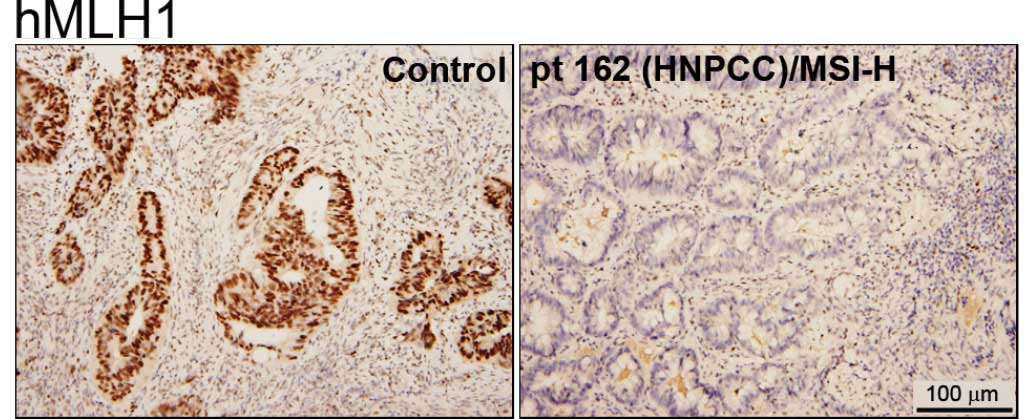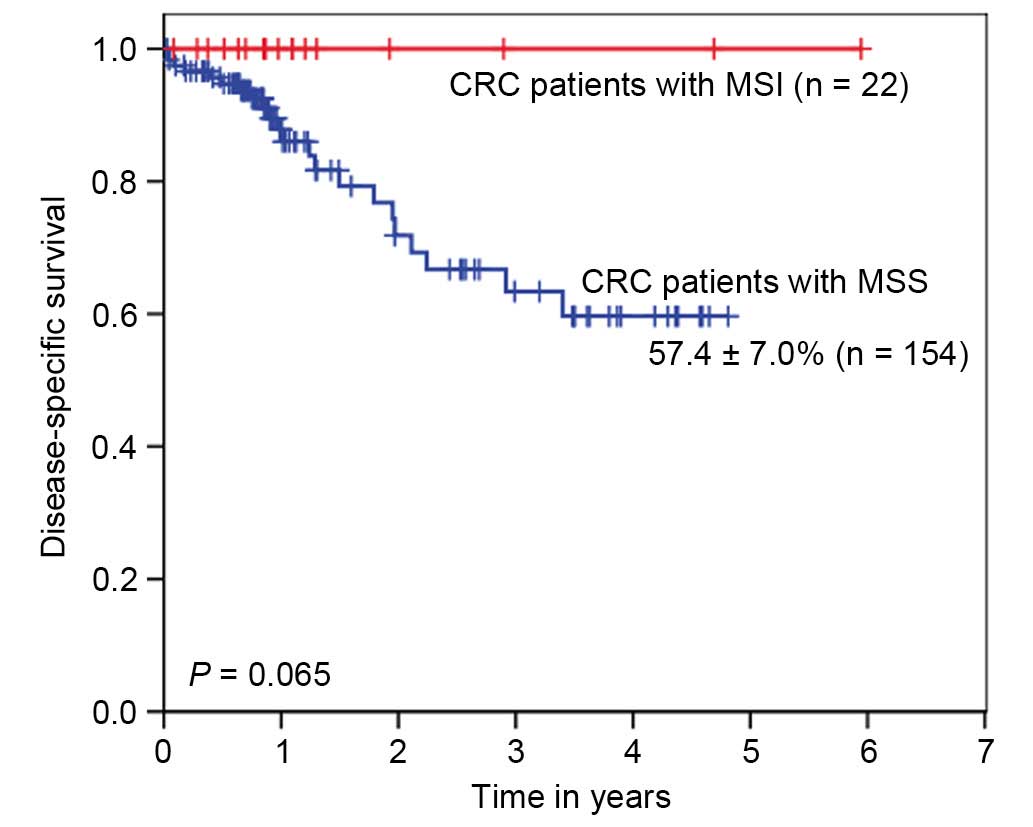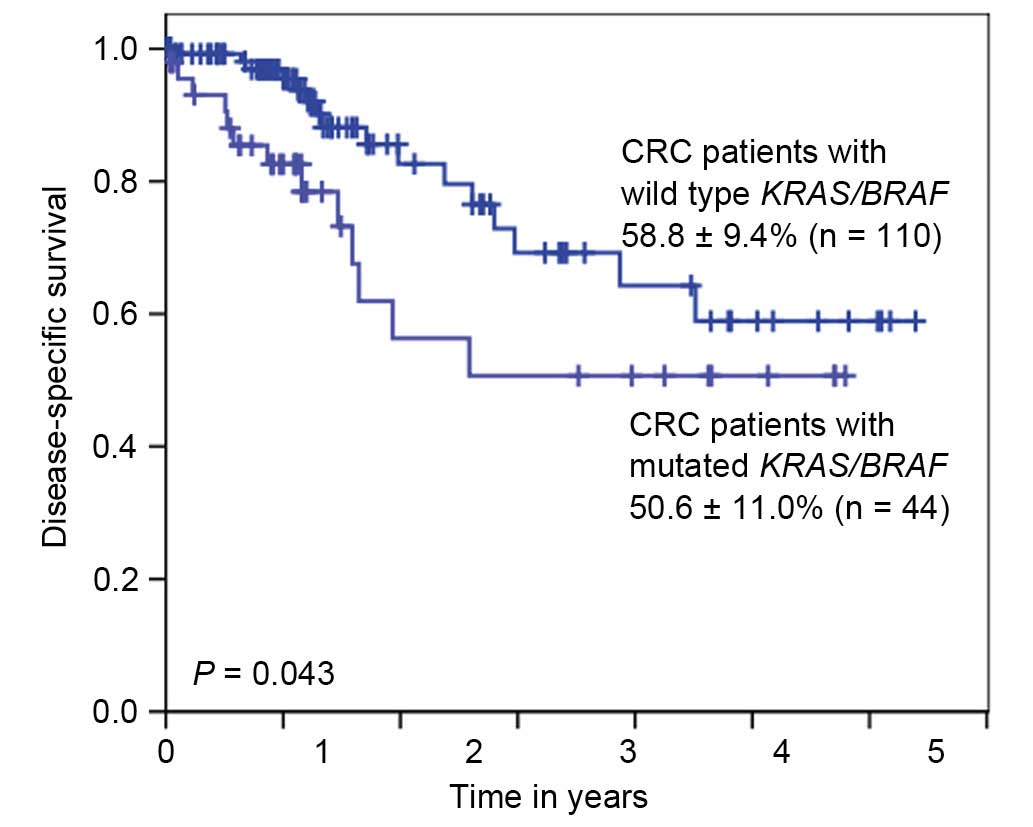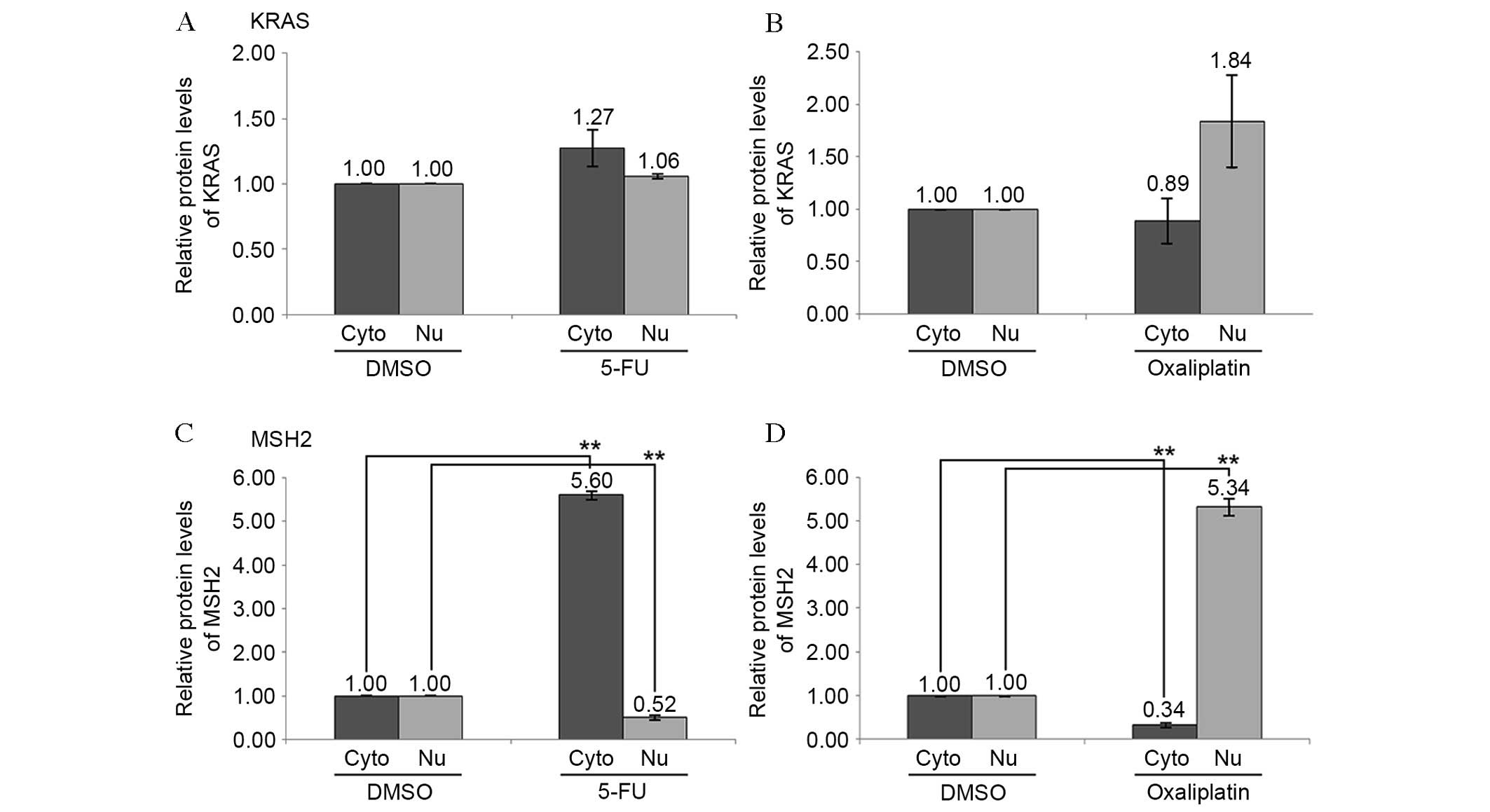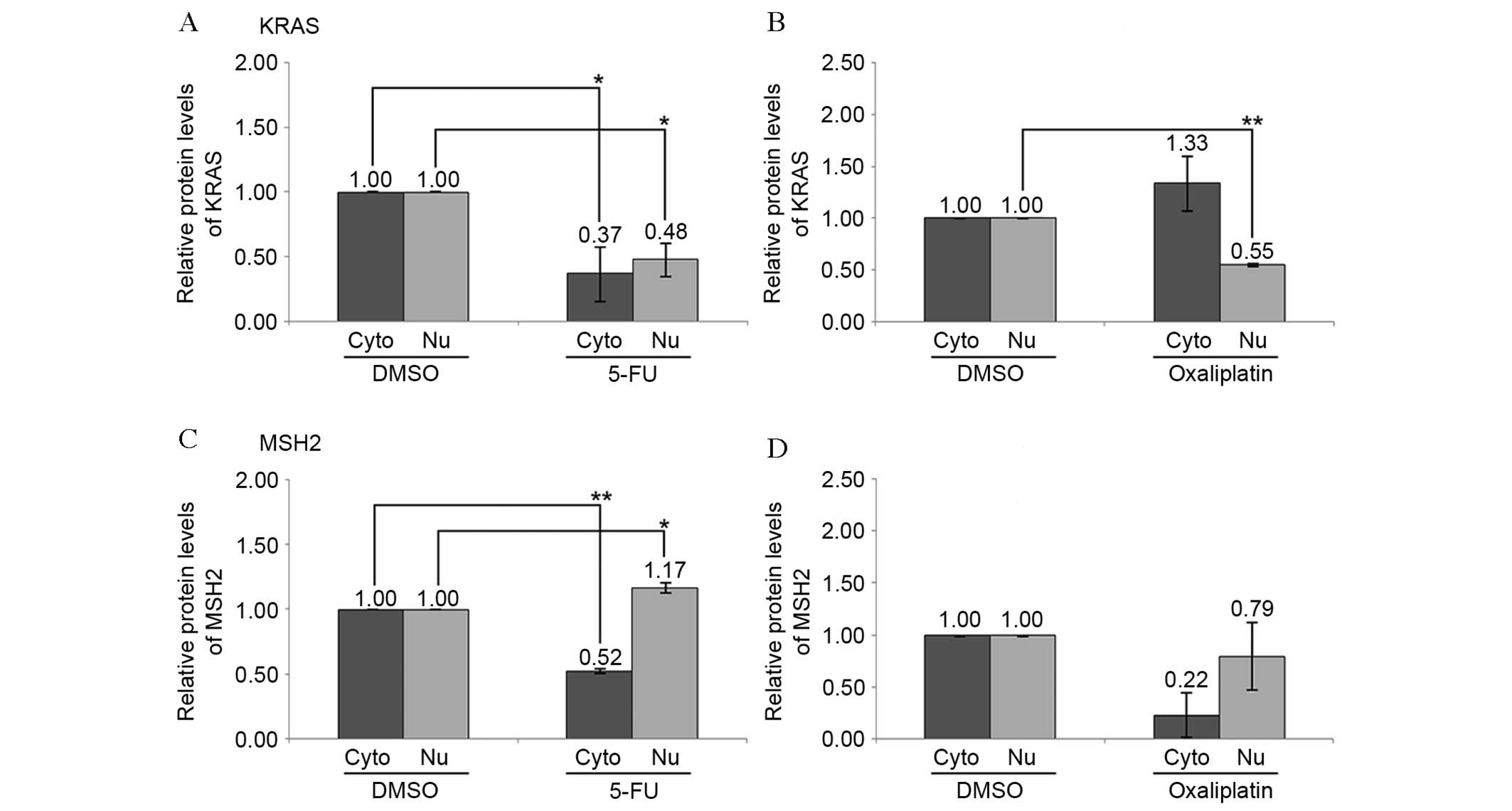|
1
|
Daniel CR, Shu X, Ye Y, Ye Y, Gu J, Raju
GS, Kopetz S and Wu X: Severe obesity prior to diagnosis limits
survival in colorectal cancer patients evaluated at a large cancer
centre. Br J Cancer. 114:103–109. 2016. View Article : Google Scholar : PubMed/NCBI
|
|
2
|
Vogelstein B, Fearon ER, Hamilton SR, Kern
SE, Preisinger AC, Leppert M, Nakamura Y, White R, Smits AM and Bos
JL: Genetic alterations during colorectal-tumor development. N Engl
J Med. 319:525–532. 1988. View Article : Google Scholar : PubMed/NCBI
|
|
3
|
Jass JR: Colorectal cancer: A multipathway
disease. Crit Rev Oncog. 12:273–287. 2006. View Article : Google Scholar : PubMed/NCBI
|
|
4
|
Peltomäki P: Deficient DNA mismatch
repair: A common etiologic factor for colon cancer. Hum Mol Genet.
10:735–740. 2001. View Article : Google Scholar : PubMed/NCBI
|
|
5
|
Aaltonen LA, Salovaara R, Kristo P,
Canzian F, Hemminki A, Peltomäki P, Chadwick RB, Kääriäinen H,
Eskelinen M, Järvinen H, et al: Incidence of hereditary
nonpolyposis colorectal cancer and the feasibility of molecular
screening for the disease. N Engl J Med. 338:1481–1487. 1998.
View Article : Google Scholar : PubMed/NCBI
|
|
6
|
Yurgelun MB, Goel A, Hornick JL, Sen A,
Turgeon DK, Ruffin MT IV, Marcon NE, Baron JA, Bresalier RS, Syngal
S, et al: Microsatellite instability and DNA mismatch repair
protein deficiency in Lynch syndrome colorectal polyps. Cancer Prev
Res (Phila). 5:574–582. 2012. View Article : Google Scholar : PubMed/NCBI
|
|
7
|
Limburg PJ, Harmsen WS, Chen HH, Gallinger
S, Haile RW, Baron JA, Casey G, Woods MO, Thibodeau SN and Lindor
NM: Prevalence of alterations in DNA mismatch repair genes in
patients with young-onset colorectal cancer. Clin Gastroenterol
Hepatol. 9:497–502. 2011. View Article : Google Scholar : PubMed/NCBI
|
|
8
|
Warrier SK, Trainer AH, Lynch AC, Mitchell
C, Hiscock R, Sawyer S, Boussioutas A and Heriot AG: Preoperative
diagnosis of Lynch syndrome with DNA mismatch repair
immunohistochemistry on a diagnostic biopsy. Dis Colon Rectum.
54:1480–1487. 2011. View Article : Google Scholar : PubMed/NCBI
|
|
9
|
Saridaki Z, Souglakos J and Georgoulias V:
Prognostic and predictive significance of MSI in stages II/III
colon cancer. World J Gastroenterol. 20:6809–6814. 2014. View Article : Google Scholar : PubMed/NCBI
|
|
10
|
Davies H, Bignell GR, Cox C, Stephens P,
Edkins S, Clegg S, Teague J, Woffendin H, Garnett MJ, Bottomley W,
et al: Mutations of the BRAF gene in human cancer. Nature.
417:949–954. 2002. View Article : Google Scholar : PubMed/NCBI
|
|
11
|
Oliveira C, Pinto M, Duval A, Brennetot C,
Domingo E, Espín E, Armengol M, Yamamoto H, Hamelin R, Seruca R and
Schwartz S Jr: BRAF mutations characterize colon but not gastric
cancer with mismatch repair deficiency. Oncogene. 22:9192–9196.
2003. View Article : Google Scholar : PubMed/NCBI
|
|
12
|
Seruca R, Velho S, Oliveira C, Leite M,
Matos P and Jordan P: Unmasking the role of KRAS and BRAF pathways
in MSI colorectal tumors. Expert Rev Gastroenterol Hepatol. 3:5–9.
2009. View Article : Google Scholar : PubMed/NCBI
|
|
13
|
Rajagopalan H, Bardelli A, Lengauer C,
Kinzler KW, Vogelstein B and Velculescu VE: Tumorigenesis: RAF/RAS
oncogenes and mismatch-repair status. Nature. 418:9342002.
View Article : Google Scholar : PubMed/NCBI
|
|
14
|
Nagasaka T, Koi M, Kloor M, Gebert J,
Vilkin A, Nishida N, Shin SK, Sasamoto H, Tanaka N, Matsubara N, et
al: Mutations in both KRAS and BRAF may contribute to the
methylator phenotype in colon cancer. Gastroenterology.
134:1950–1960, 1960.e1. 2008. View Article : Google Scholar : PubMed/NCBI
|
|
15
|
Naguib A, Mitrou PN, Gay LJ, Cooke JC,
Luben RN, Ball RY, McTaggart A, Arends MJ and Rodwell SA: Dietary,
lifestyle and clinicopathological factors associated with BRAF and
K-ras mutations arising in distinct subsets of colorectal cancers
in the EPIC Norfolk study. BMC Cancer. 10:992010. View Article : Google Scholar : PubMed/NCBI
|
|
16
|
Ooki A, Akagi K, Yatsuoka T, Asayama M,
Hara H, Takahashi A, Kakuta M, Nishimura Y and Yamaguchi K:
Combined microsatellite instability and BRAF gene status as
biomarkers for adjuvant chemotherapy in stage III colorectal
cancer. J Surg Oncol. 110:982–988. 2014. View Article : Google Scholar : PubMed/NCBI
|
|
17
|
Oliveira C, Velho S, Moutinho C, Ferreira
A, Preto A, Domingo E, Capelinha AF, Duval A, Hamelin R, Machado
JC, et al: KRAS and BRAF oncogenic mutations in MSS colorectal
carcinoma progression. Oncogene. 26:158–163. 2007. View Article : Google Scholar : PubMed/NCBI
|
|
18
|
Demes M, Scheil-Bertram S, Bartsch H and
Fisseler-Eckhoff A: Signature of microsatellite instability, KRAS
and BRAF gene mutations in German patients with locally advanced
rectal adenocarcinoma before and after neoadjuvant 5-FU
radiochemotherapy. J Gastrointest Oncol. 4:182–192. 2013.PubMed/NCBI
|
|
19
|
Wong A and Ma BB: Personalizing therapy
for colorectal cancer. Clin Gastroenterol Hepatol. 12:139–144.
2014. View Article : Google Scholar : PubMed/NCBI
|
|
20
|
Cohen R, Svrcek M, Dreyer C, Cervera P,
Duval A, Pocard M, Fléjou JF, de Gramont A and André T: New
therapeutic opportunities based on DNA mismatch repair and BRAF
status in metastatic colorectal cancer. Curr Oncol Rep. 18:182016.
View Article : Google Scholar : PubMed/NCBI
|
|
21
|
Carethers JM, Chauhan DP, Fink D, Nebel S,
Bresalier RS, Howell SB and Boland CR: Mismatch repair proficiency
and in vitro response to 5-fluorouracil. Gastroenterology.
117:123–131. 1999. View Article : Google Scholar : PubMed/NCBI
|
|
22
|
Fischer H, Stenling R, Rubio C and
Lindblom A: Differential expression of aquaporin 8 in human colonic
epithelial cells and colorectal tumors. BMC Physiol. 1:12001.
View Article : Google Scholar : PubMed/NCBI
|
|
23
|
Fujita H, Kato J, Horii J, Harada K,
Hiraoka S, Shiraha H, Sakaguchi K and Shiratori Y: Decreased
expression of hMLH1 correlates with reduced 5-fluorouracil-mediated
apoptosis in colon cancer cells. Oncol Rep. 18:1129–1137.
2007.PubMed/NCBI
|
|
24
|
Boland CR and Goel A: Microsatellite
instability in colorectal cancer. Gastroenterology.
138:2073–2087.e3. 2010. View Article : Google Scholar : PubMed/NCBI
|
|
25
|
Nöpel-Dünnebacke S, Schulmann K,
Reinacher-Schick A, Porschen R, Schmiegel W, Tannapfel A and
Graeven U: Prognostic value of microsatellite instability and p53
expression in metastatic colorectal cancer treated with oxaliplatin
and fluoropyrimidine-based chemotherapy. Z Gastroenterol.
52:1394–1401. 2014. View Article : Google Scholar : PubMed/NCBI
|
|
26
|
Huang CJ, Liao HT, Yeh GC and Hung KL:
Distribution of HLA-DQB1 alleles in patients with Kleine-Levin
syndrome. J Clin Neurosci. 19:628–630. 2012. View Article : Google Scholar : PubMed/NCBI
|
|
27
|
Loukola A, Eklin K, Laiho P, Salovaara R,
Kristo P, Järvinen H, Mecklin JP, Launonen V and Aaltonen LA:
Microsatellite marker analysis in screening for hereditary
nonpolyposis colorectal cancer (HNPCC). Cancer Res. 61:4545–4549.
2001.PubMed/NCBI
|
|
28
|
Jensen SA, Vainer B, Kruhøffer M and
Sørensen JB: Microsatellite instability in colorectal cancer and
association with thymidylate synthase and dihydropyrimidine
dehydrogenase expression. BMC Cancer. 9:252009. View Article : Google Scholar : PubMed/NCBI
|
|
29
|
Schneider M, Scholtka B, Gottschalk U,
Faiss S, Schatz D, Berghof-Jäger K and Steinberg P: Detection of up
to 65% of precancerous lesions of the human colon and rectum by
mutation analysis of APC, K-Ras, B-Raf and CTNNB1. Cancers (Basel).
3:91–105. 2010. View Article : Google Scholar : PubMed/NCBI
|
|
30
|
Chien CC, Chen SH, Liu CC, Lee CL, Yang
RN, Yang SH and Huang CJ: Correlation of K-ras codon 12 mutations
in human feces and ages of patients with colorectal cancer (CRC).
Transl Res. 149:96–102. 2007. View Article : Google Scholar : PubMed/NCBI
|
|
31
|
Shahrzad S, Quayle L, Stone C, Plumb C,
Shirasawa S, Rak JW and Coomber BL: Ischemia-induced K-ras
mutations in human colorectal cancer cells: Role of
microenvironmental regulation of MSH2 expression. Cancer Res.
65:8134–8141. 2005. View Article : Google Scholar : PubMed/NCBI
|
|
32
|
Ewalt M, Nandula S, Phillips A, Alobeid B,
Murty VV, Mansukhani MM and Bhagat G: Real-time PCR-based analysis
of BRAF V600E mutation in low and intermediate grade lymphomas
confirms frequent occurrence in hairy cell leukaemia. Hematol
Oncol. 30:190–193. 2012. View Article : Google Scholar : PubMed/NCBI
|
|
33
|
Deng G, Bell I, Crawley S, Gum J, Terdiman
JP, Allen BA, Truta B, Sleisenger MH and Kim YS: BRAF mutation is
frequently present in sporadic colorectal cancer with methylated
hMLH1, but not in hereditary nonpolyposis colorectal cancer. Clin
Cancer Res. 10:191–195. 2004. View Article : Google Scholar : PubMed/NCBI
|
|
34
|
Banno K, Yanokura M, Kobayashi Y,
Kawaguchi M, Nomura H, Hirasawa A, Susumu N and Aoki D: Endometrial
cancer as a familial tumor: Pathology and molecular carcinogenesis
(review). Curr Genomics. 10:127–132. 2009. View Article : Google Scholar : PubMed/NCBI
|
|
35
|
Zlobec I, Bihl MP, Schwarb H, Terracciano
L and Lugli A: Clinicopathological and protein characterization of
BRAF- and K-RAS-mutated colorectal cancer and implications for
prognosis. Int J Cancer. 127:367–380. 2010.PubMed/NCBI
|
|
36
|
Dunn EF, Iida M, Myers RA, Campbell DA,
Hintz KA, Armstrong EA, Li C and Wheeler DL: Dasatinib sensitizes
KRAS mutant colorectal tumors to cetuximab. Oncogene. 30:561–574.
2011. View Article : Google Scholar : PubMed/NCBI
|
|
37
|
Hong SP, Min BS, Kim TI, Cheon JH, Kim NK,
Kim H and Kim WH: The differential impact of microsatellite
instability as a marker of prognosis and tumour response between
colon cancer and rectal cancer. Eur J Cancer. 48:1235–1243. 2012.
View Article : Google Scholar : PubMed/NCBI
|
|
38
|
Phipps AI, Limburg PJ, Baron JA,
Burnett-Hartman AN, Weisenberger DJ, Laird PW, Sinicrope FA, Rosty
C, Buchanan DD, Potter JD and Newcomb PA: Association between
molecular subtypes of colorectal cancer and patient survival.
Gastroenterology. 148:77–87.e2. 2015. View Article : Google Scholar : PubMed/NCBI
|
|
39
|
Huang CJ, Yang SH, Huang SM, Lin CM, Chien
CC, Chen YC, Lee CL, Wu HH and Chang CC: A predicted protein,
KIAA0247, is a cell cycle modulator in colorectal cancer cells
under 5-FU treatment. J Transl Med. 9:822011. View Article : Google Scholar : PubMed/NCBI
|
|
40
|
Figueiredo JC, Lewinger JP, Song C,
Campbell PT, Conti DV, Edlund CK, Duggan DJ, Rangrej J, Lemire M,
Hudson T, et al: Genotype-environment interactions in
microsatellite stable/microsatellite instability-low colorectal
cancer: Results from a genome-wide association study. Cancer
Epidemiol Biomarkers Prev. 20:758–766. 2011. View Article : Google Scholar : PubMed/NCBI
|
|
41
|
Markovic S, Antic J, Dragicevic N, Hamelin
R and Krivokapic Z: High-frequency microsatellite instability and
BRAF mutation (V600E) in unselected Serbian patients with
colorectal cancer. J Mol Histol. 43:137–143. 2012. View Article : Google Scholar : PubMed/NCBI
|
|
42
|
Nash GM, Gimbel M, Cohen AM, Zeng ZS,
Ndubuisi MI, Nathanson DR, Ott J, Barany F and Paty PB: KRAS
mutation and microsatellite instability: Two genetic markers of
early tumor development that influence the prognosis of colorectal
cancer. Ann Surg Oncol. 17:416–424. 2010. View Article : Google Scholar : PubMed/NCBI
|
|
43
|
Qiu J, Compagnone M, Laibe S, Lagarde A,
Goncalves A, Turrini O, Xerri L, Monges G and Olschwang S: BRAF
p.Val600Glu (V600E) somatic mutation is mainly associated with MSS
phenotype in metastatic colorectal cancer. Cancer Genomics
Proteomics. 8:15–18. 2011.PubMed/NCBI
|
|
44
|
Birgisson H, Edlund K, Wallin U, Påhlman
L, Kultima HG, Mayrhofer M, Micke P, Isaksson A, Botling J,
Glimelius B and Sundström M: Microsatellite instability and
mutations in BRAF and KRAS are significant predictors of
disseminated disease in colon cancer. BMC Cancer. 15:1252015.
View Article : Google Scholar : PubMed/NCBI
|
|
45
|
Li WQ, Kawakami K, Ruszkiewicz A, Bennett
G, Moore J and Iacopetta B: BRAF mutations are associated with
distinctive clinical, pathological and molecular features of
colorectal cancer independently of microsatellite instability
status. Mol Cancer. 5:22006. View Article : Google Scholar : PubMed/NCBI
|
|
46
|
Hutchins G, Southward K, Handley K, Magill
L, Beaumont C, Stahlschmidt J, Richman S, Chambers P, Seymour M,
Kerr D, et al: Value of mismatch repair, KRAS, and BRAF mutations
in predicting recurrence and benefits from chemotherapy in
colorectal cancer. J Clin Oncol. 29:1261–1270. 2011. View Article : Google Scholar : PubMed/NCBI
|
|
47
|
Di Nicolantonio F, Martini M, Molinari F,
Sartore-Bianchi A, Arena S, Saletti P, De Dosso S, Mazzucchelli L,
Frattini M, Siena S and Bardelli A: Wild-type BRAF is required for
response to panitumumab or cetuximab in metastatic colorectal
cancer. J Clin Oncol. 26:5705–5712. 2008. View Article : Google Scholar : PubMed/NCBI
|
|
48
|
Lech G, Slotwinski R and Krasnodebski IW:
The role of tumor markers and biomarkers in colorectal cancer.
Neoplasma. 61:1–8. 2014. View Article : Google Scholar : PubMed/NCBI
|
|
49
|
Janakiraman M, Vakiani E, Zeng Z, Pratilas
CA, Taylor BS, Chitale D, Halilovic E, Wilson M, Huberman K, Filho
JC Ricarte, et al: Genomic and biological characterization of exon
4 KRAS mutations in human cancer. Cancer Res. 70:5901–5911. 2010.
View Article : Google Scholar : PubMed/NCBI
|
|
50
|
Chun P and Wainberg ZA: Adjuvant
chemotherapy for Stage II colon cancer: The role of molecular
markers in choosing therapy. Gastrointest Cancer Res. 3:191–196.
2009.PubMed/NCBI
|
|
51
|
Smith G, Bounds R, Wolf H, Steele RJ,
Carey FA and Wolf CR: Activating K-Ras mutations outwith ‘hotspot’
codons in sporadic colorectal tumours-implications for personalised
cancer medicine. Br J Cancer. 102:693–703. 2010. View Article : Google Scholar : PubMed/NCBI
|
|
52
|
Center MM, Jemal A, Smith RA and Ward E:
Worldwide variations in colorectal cancer. CA Cancer J Clin.
59:366–378. 2009. View Article : Google Scholar : PubMed/NCBI
|
|
53
|
Collura A, Lagrange A, Svrcek M, Marisa L,
Buhard O, Guilloux A, Wanherdrick K, Dorard C, Taieb A, Saget A, et
al: Patients with colorectal tumors with microsatellite instability
and large deletions in HSP110 T17 have improved response to
5-fluorouracil-based chemotherapy. Gastroenterology.
146:401–411.e1. 2014. View Article : Google Scholar : PubMed/NCBI
|
|
54
|
Matsuyama T, Ishikawa T, Mogushi K,
Yoshida T, Iida S, Uetake H, Mizushima H, Tanaka H and Sugihara K:
MUC12 mRNA expression is an independent marker of prognosis in
stage II and stage III colorectal cancer. Int J Cancer.
127:2292–2299. 2010. View Article : Google Scholar : PubMed/NCBI
|















